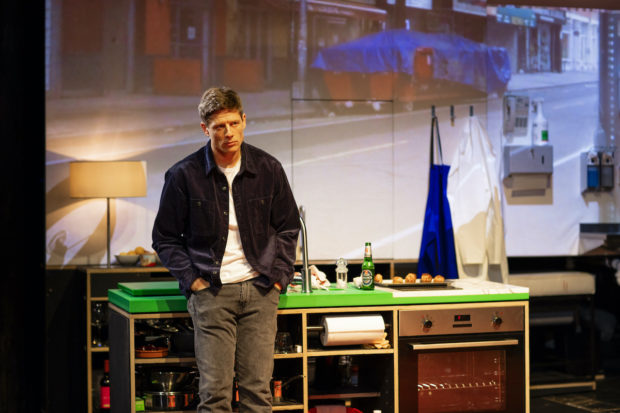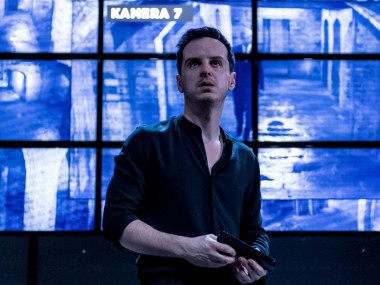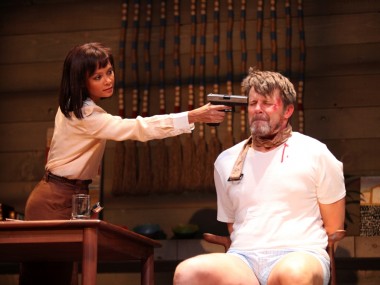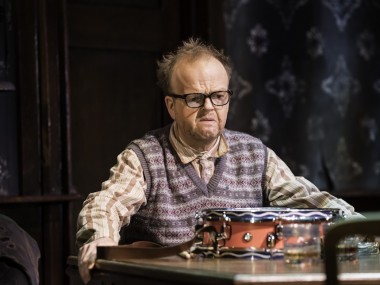A Little Life, Harold Pinter Theatre
Saturday 1st April 2023

Wow! James Norton naked! Wow! New play by Ivo van Hove. Wow! It’s four hours long. Wow! Wow! Wow! The much anticipated play of the year, an adaptation of Hanya Yanagihara’s 700-page bestselling novel of 2015, comes to the West End in a huge blaze of publicity. It’s been hyped as the must-see show of the season, and its superstar is the heartthrob Norton, an actor who can make a psycho interesting (Happy Valley) and an international criminal attractive (McMafia). But can the equally well-regarded Van Hove — whose theatre work in Britain has garnered praise from all quarters for more than a decade — make this production work in the West End?
The first thing to say is that A Little Life is, for Van Hove, a labour of something like love. He has repeatedly toured a Dutch version of the show all over the world, and brought it to Edinburgh last year. Yanagihara’s Booker-prize shortlisted novel is certainly controversial: it is a child abuse story of such relentless trauma that it forces you to either praise its subversive refusal to offer any consolations or to reject it as a highly manipulative example of the current trend for misery lit. So is the stage version, adapted by Van Hove with help from Koen Tachelet and Yanagihara, a thoughtful exploration of the incurability of childhood trauma — or an example of trauma porn?
The set-up is a group of privileged New York professionals (if this turns you off stop reading here): there’s Willem, clean-cut actor who makes it to Hollywood; Malcolm, an architect who can afford to design wonderful abodes for his friends; and JB, an artist whose paintings are sought by MOMA. And then there’s Jude (Norton of course), a highly successful lawyer who is an enigma: why does he never talk about his past; why does he have no lovers? Who, in a deep way, is he really? As readers of the novel know very well, and the rest of us can soon easily guess, Jude is the victim of child abuse. As the details of this spill out, you are forced to marvel at just how tormented his life has been.
I mean, talk about baroque exaggeration: Jude is not only an orphan, but he’s been abandoned next to a garbage can; he has not only been sexually abused by monks, but also beaten regularly; he is not only forced into sex work as a child, but also made to perform sex acts for Brother Luke, his pimp; he witnesses not only the suicide of one abuser, but is kidnapped, raped and seriously assaulted by a rogue doctor. Later, as an adult he is further assaulted by a lover called Caleb. Enough, enough, you long to shout. But it’s a theatre and you can’t. The result of all this is that Jude is so traumatised he cannot talk about his life. I can’t say that I’m surprised.
The sheer excess of the cruelty inflicted on Jude actually makes him less sympathetic as a character. The sheer trauma of his experiences is not only revolting, but puts him in a kind of league of his own. The sheer stubbornness of his refusal to seek therapy, despite the promptings of the ghost of Ana, his now dead social worker, makes him a symbol of self-destruction. But the trouble with symbols is that you can’t really relate to them — despite all of Norton’s well-focused efforts I could never connect with his performance of Jude’s pain. It was just too big, too grand, too operatic. And I also had the appalled thought that this kind of majestic suffering has the effect of making those whose trauma is less phenomenal feel somehow less important. Yes, Jude is at the top of the victimhood hierarchy.
Van Hove’s production really doesn’t help. While I am told that it is sincerely faithful to the novel, the staging is characterised by repeated episodes of Jude’s self-harming. Cutting, then burning. The first time it is shocking, then less and less so. By the end, the decision to dress the character in a blood-soaked white shirt and blood-stained grey trousers for scene after scene felt to me like a nasty glorying in violence. Likewise, watching him being humiliated in the nude seems literal and unnecessary. What are we meant to think? Poor Jude? Or a relief that whatever bad stuff happens to us will never be as bad as this?
There’s something deeply distasteful about Jude the semi-obscure. Because he doesn’t really engage with other people, despite an improbable love affair with Willem, he is so successful at concealment that the audience knows little about his inner life. Likewise, and despite the efforts of Harold, a rich professor who adopts him as an adult, and Andy, a hardworking doctor, he never really opens up. If trauma porn depends on the victim having an authority of painful experience that makes them different from the rest of us, how does this function as entertainment? The audience becomes complicit in the representation of pain, and perhaps numbed by its horror.
It is also significant that Jude’s surname is St Francis. The point of fictionalized mega-trauma is to create secular saints, whose elaborate sufferings teach the rest of us to be grateful, to not complain, to forget about small traumas that are not in the same league as big traumas. Like all religious ideologies this one is oppressive and exploitative. I think that A Little Life is a play that hates people, and especially damaged people. It has none of the punk style and bleak wit that characterises in-yer-face theatre, and its joyless, overwrought and longwinded depiction of hurt and anguish seems an odd choice for the commercial West End.
But, as you would expect, Van Hove directs with great fluidity, giving the show a smoothness of storytelling that might incline you to forgive the clumsy exposition and the lack of any real sense that Jude has a subjective life. With a live string quartet which provides punctuation, and a versatile set by long-time collaborator Jan Versweyveld, the theatricality of the piece is always impressive, although I was too often distracted by the constant video stream of New York streets, and irritated by the fake in-the-round staging. On the sides of the open stage there is constant, and similarly distracting, cooking, painting and building design. The repeated need to mop up the spilled blood (lots and lots of it) is depressingly like a counsel of despair.
Anyway, Norton’s performance recalls his role as the Reverend in Grantchester, but minus the charm and smiles. Here the over-hyped actor specializes in a concerted display of blankness, punctuated by a few dramatic moments of utterly agonised pain. It’s an excruciating spectacle in a show that, despite the odd blast of dance music and one lovely dance sequence, is unrelentingly dark and dismal. Even worse, Norton doesn’t seem to have any rapport with the other actors. The rest of the diverse cast — Luke Thompson (Willem), Omari Douglas (JB), Zach Wyatt (Malcolm), Zubin Varla (Harold), Emilio Doorgasingh (Andy), Nathalie Armin (Ane) and Elliot Cowan (all the abusers) — do good work, but the play remains a tortuous account of unrelieved trauma.
This review first appeared on The Arts Desk





4 Comments
on Saturday 20th May 2023 at 6:54 pm
on Sunday 16th July 2023 at 2:39 pm
on Wednesday 26th July 2023 at 3:36 pm
on Monday 8th April 2024 at 4:08 pm